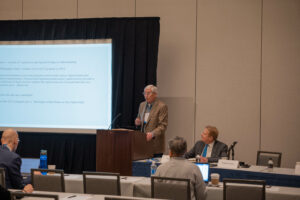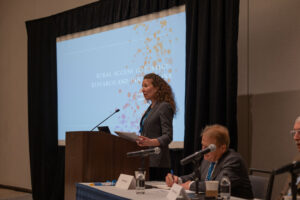At the 2025 ABA Midyear Meeting, legal experts gathered to debate a critical question: Should people facing civil legal issues be denied help entirely if they cannot afford a lawyer, or should trained non-lawyers be allowed to assist?
The ABF Fellows CLE Program, titled “The Age-Old Question Facing All of Us – Deny People Any Help or Allow Some Help by Non-Lawyers: An Innovation’s Odyssey,” featured a panel of experts introduced by ABF Patron Fellow Don Bivens. The discussion included ABF Research Professor Emeritus Stephen Daniels, ABF Affiliated Scholar Michele Statz (also Associate Professor at the University of Minnesota Medical School and Affiliated Faculty at the University of Minnesota Law School), and Rodolfo Sanchez, Executive Director of DNA People’s Legal Services. The program was cosponsored by the ABA Senior Lawyers Division.
The Evolution of Community Justice Workers

ABF Research Professor Emeritus Stephen Daniels during the ABF Fellows CLE Program. Daniels framed the Community Justice Worker (CJW) model as an odyssey, a “series of experiences giving knowledge and understanding.” He traced its origins to Washington State’s Limited License Legal Technician (LLLT) program, launched in 2012. Although the program was sunsetted in 2020, it sparked interest in alternative legal service models. Today, Arizona, Colorado, Oregon, and Utah have implemented CJW programs, while Minnesota has developed a similar system requiring attorney supervision.
Drawing a comparison to healthcare, he likened CJWs to nurse practitioners, who were introduced to expand care in underserved areas. “They exist because of the same problems we see in the legal arena,” he noted, referencing his recent research.
Read an interview with Daniels in ABF’s Featured Researcher column here.

Rural Legal Deserts and Scalable Solutions
Next, Statz described the access to justice context. While three-quarters of rural residents encounter civil legal problems, only 2% of civil justice practitioners are based in small towns. Beyond the legal “desert,” additional economic, digital, and policy barriers further limit access to legal assistance. In light of these challenges, she highlighted promising work conducted with Alaska Legal Services Corporation and its Executive Director Nikole Nelson during Statz’s time as a 2021–2022 ABF/JPB Access to Justice Scholar. Their efforts focused on training trusted community justice workers to deliver culturally relevant legal aid in remote areas.
Watch a video about Statz’s work with Alaska Legal Services Corporation here.
Sanchez, whose organization, DNA People’s Legal Services, provides legal assistance across the Navajo, Hopi, and Jicarilla Apache Nations—as well as parts of Arizona, New Mexico, and Utah—emphasized that no single solution can resolve access-to-justice challenges. “There is no silver bullet,” he said, describing DNA’s initiatives, including telephone intake services, mobile hotspot programs, and vehicle outreach to reach clients in isolated areas. Like his fellow panelists, he sees CJW programs as a promising model for expanding access to legal aid.
Balancing Innovation with Ethical Concerns
During the Q&A, former ABF Board President Jimmy Goodman raised questions about longstanding concerns regarding ethics, confidentiality, and competency. He also asked whether expanding non-lawyer assistance risks undermining rural lawyers or shifting resources away from the legal profession. “Are we working for our profession,” he asked, “or taking opportunities away from young rural lawyers?” He further inquired about data supporting the effectiveness of CJW programs.
“We actually have a lot of data,” Statz responded. “In terms of case outcomes, they’re analogous. Ethical concerns exist, but no more nor less.” She pointed to research by Elizabeth Chambliss of Joseph F. Rice School of Law, University of South Carolina, stressing that the true risk is not competition with rural lawyers but the growing absence of legal professionals in underserved communities.
An audience member added that while expanding access to justice is crucial, well-intentioned reforms must continue to be mindful of ethical considerations that many lawyers hold deeply.
Event Audio Recording Now Available:
###
About the American Bar Foundation
The American Bar Foundation (ABF) is the world’s leading research institute for the empirical and interdisciplinary study of law. The ABF seeks to expand knowledge and advance justice through innovative, interdisciplinary, and rigorous empirical research on law, legal processes, and legal institutions. To further this mission the ABF will produce timely, cutting-edge research of the highest quality to inform and guide the legal profession, the academy, and society in the United States and internationally. The ABF’s primary funding is provided by the American Bar Endowment and the Fellows of The American Bar Foundation.
